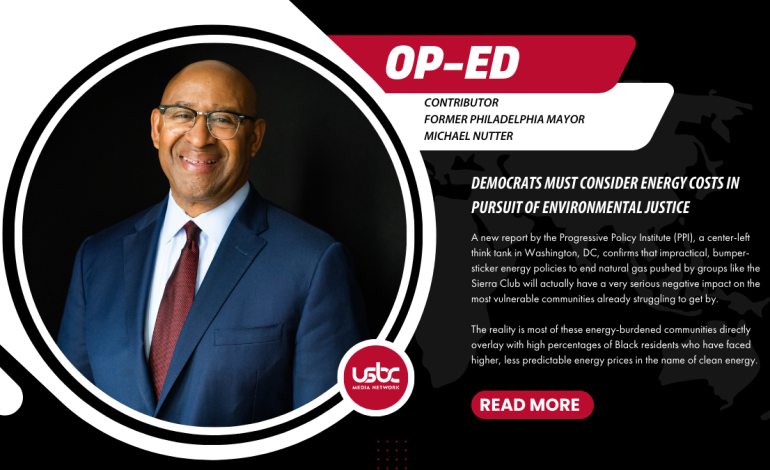Michael A. Nutter: We should support an affordable, inclusive energy transition
By Michael A. Nutter, Natural Allies Leadership Council Co-Chair | The Philadelphia Inquirer 02/17/2025
This winter, parts of the South have experienced unprecedented levels of snowfall, the Philadelphia region has faced its own share of big snowstorms, and the nation as a whole has endured the coldest January in almost a decade and a half.
As the temperatures fall, the demand rises for electricity and natural gas; consumption of the latter hit an all-time record last month as customers cranked up their heaters. With increased weather volatility and rising consumer costs, we must act fast on the seriousness of climate change and do so responsibly, without losing sight of the affordability and reliability we all deserve.
As we move toward a more diverse energy mix, our choices can’t leave historically marginalized communities behind. That’s why scaling up renewable sources — with natural gas as a foundation — is the most immediate, affordable, and practical way forward to protect energy bills, ensure the power comes on when we need it, and reduce greenhouse gas emissions.
As an original founder of Climate Mayors, a national nonprofit organization, and as a former mayor of Philadelphia, I know about balancing competing objectives, finding common ground, and getting things done.
When I listen to far-reaching policies pitched by some of my fellow Democrats around energy, I find myself thinking about the working families and seniors in Philadelphia who simply don’t have the disposable income necessary to make that vision a reality.
There must be a middle ground.
Count me in for renewables. I applaud plans for a hydrogen hub in Philadelphia and the passage of the clean energy measures contained in the Inflation Reduction Act. But these things take time.
Meanwhile, we shouldn’t forget natural gas drives reductions in emissions, is responsible for over 60% of America’s carbon emission reductions since 2005, is the source of half our state’s electricity, and also directly heats over half of Pennsylvania homes.
The trouble when we talk about an energy transition is that clean energy programs are often out of reach for many, and in particular, the most vulnerable populations and low-income households.
Home solar arrays can cost upwards of $30,000 to install, more than the median household wealth for Black homeowners or renters. New electric-only appliances needed to meet the transition are expensive, and often, challenges like older housing stock in cities with poor insulation, deteriorating roofs, or poor personal credit make these options impossible to access.
Separately, 25% of American households are already energy-burdened, with a disproportionate share across Hispanic, Black, and Native American households. And when families struggle to pay for energy, a Robert Wood Johnson Foundation study found it impacts physical health, performance in schools, as well as economic well-being.
Meanwhile, in some parts of the country, power bills are rising — and that’s largely before we see the important but costly build-out of new zero-carbon power generation and thousands of miles of transmission lines needed in the years ahead. As we scale up that infrastructure, natural gas-powered electricity can quickly fill the gaps when renewables alone can’t adequately meet demand.
In New Jersey, regulators began the rulemaking to ban natural gas systems from commercial buildings, schools, and other large buildings, and require a transition to electric-only boilers. The policy fell through because a miscalculation found it would dramatically raise electric bills by as much as five times their current levels. It’s a warning sign for policymakers about ideological rhetoric missing reality on the ground.
Natural gas, especially with its abundance in Pennsylvania, is the most affordable option for energy-burdened households. Since 2008, the average price for customers is down as much as 76%. In Pennsylvania, households using natural gas save $1,100 to $2,200 annually.
Our state’s leaders have recognized the value of natural gas, too. Gov. Josh Shapiro has advocated for a balanced approach that embraces natural gas and climate protection. Notably, he remarked last year that the nation’s pause on liquefied natural gas export approvals “needs to be brief” due to the negative impact on Pennsylvania jobs and our economy. In recent years, Pennsylvania’s senatorial delegation has raised similar concerns.
Climate change is upon us and is impacting historically marginalized communities harder than any other group in the country. The combination of climate change and the increasing lack of affordable energy is quickly becoming one of the most urgent, widespread civil rights issues of our time.
We must protect underserved communities from the impacts of climate change while ensuring they have access to reliable, affordable energy. Renewables, working with natural gas, can accelerate our path to a clean energy future.
Michael A. Nutter served as the 98th mayor of Philadelphia from 2008 to 2016.

